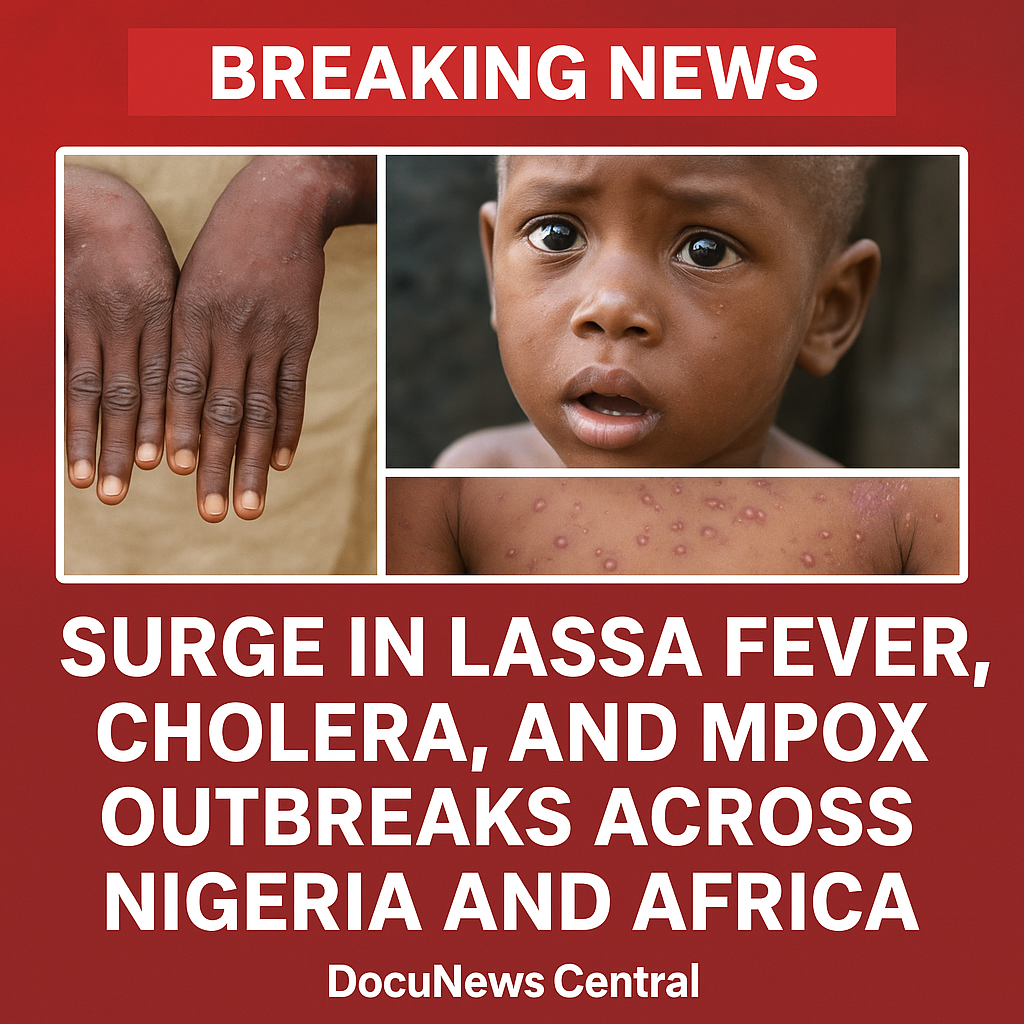
Breaking News: Surge in Lassa Fever, Cholera, and Mpox Outbreaks Across Nigeria and Africa
In recent weeks, Nigeria and several African nations have witnessed alarming surges in the incidences of Lassa fever, cholera, and mpox (formerly known as monkeypox). Consequently, these outbreaks have prompted urgent responses from health authorities and international organizations to mitigate their spread and impact.
Lassa Fever Outbreak Intensifies in Nigeria
Nigeria is grappling with a significant resurgence of Lassa fever, a viral hemorrhagic disease endemic to West Africa. As of late September 2025, the Nigeria Centre for Disease Control and Prevention (NCDC) reported 7,673 suspected cases and 166 confirmed deaths, yielding a case fatality rate (CFR) of 18.5% (NCDC Report).
The majority of these cases have been concentrated in Ondo, Bauchi, Edo, Taraba, and Ebonyi states. The World Health Organization (WHO) emphasizes the endemic nature of Lassa fever in Nigeria and neighboring countries, highlighting the urgent need for enhanced surveillance and preventive measures (WHO Africa).
In response, Nigerian health authorities have intensified public awareness campaigns and are collaborating with international partners to expedite the development of a preventive vaccine (CEPI).
Cholera Outbreaks Claim Lives in Nigeria and Beyond
Cholera, a waterborne disease characterized by severe diarrhea and dehydration, has also seen a resurgence in Nigeria. In Bauchi State, a cholera outbreak has resulted in 58 deaths and over 250 confirmed cases, prompting the establishment of emergency response committees to bolster containment efforts (Reuters).
Similarly, the Democratic Republic of the Congo (DRC) is experiencing a severe cholera outbreak. Between January and August 2025, the DRC reported 46,800 cholera cases and 1,362 deaths, with the highest incidence observed in Kwango province (WHO DRC).
Health authorities in affected regions are focusing on improving water, sanitation, and hygiene (WASH) infrastructure, alongside administering oral cholera vaccines to at-risk populations (WHO Report).
Mpox Cases Emerge in West Africa
Mpox, a viral disease previously known as monkeypox, continues to pose a public health challenge in West Africa. Recent reports indicate that Sierra Leone has declared a state of emergency following the confirmation of two mpox cases within four days, neither of which had direct contact with known infected individuals (AP News).
Although the WHO lifted the global mpox Public Health Emergency of International Concern designation in May 2023 due to a sustained decline in cases, sporadic infections continue to emerge, underscoring the need for vigilance and preparedness (PMC Article).
Global Health Implications and Response Strategies
The concurrent outbreaks of Lassa fever, cholera, and mpox in Nigeria and other African nations highlight the interconnectedness of public health challenges across the continent. Therefore, a coordinated response is essential, including robust surveillance systems, rapid diagnostic capabilities, and effective communication strategies to inform and protect communities.
International organizations such as the WHO and UNICEF are actively supporting affected countries through technical assistance, resources, and expertise. Their efforts focus on strengthening health systems, enhancing disease detection and response mechanisms, and promoting preventive measures to curb the spread of these infectious diseases.
Preventive Measures and Public Awareness
Health authorities are urging the public to adhere to preventive practices to reduce infection risks:
- Lassa Fever: Avoid contact with rodents and their excreta, practice good hygiene, and seek prompt medical attention if symptoms develop.
- Cholera: Ensure access to clean drinking water, practice regular handwashing with soap, and avoid unclean food and water sources.
- Mpox: Avoid close contact with individuals displaying symptoms and follow travel advisories issued by health authorities.
Community engagement and education are pivotal to reinforcing these messages and ensuring widespread adherence to recommended health practices.
Conclusion
The resurgence of Lassa fever, cholera, and mpox in Nigeria and other parts of Africa serves as a stark reminder of the persistent threat posed by infectious diseases. While significant strides have been made in understanding and combating these diseases, the current outbreaks underscore the need for sustained investment in public health infrastructure, research, and international collaboration. By strengthening these areas, African nations can enhance their resilience against future health threats and safeguard the well-being of their populations.
Related News
- Crowded camps, stagnant water and not enough doctors: first the floods, now disease stalks millions in Pakistan
- Ivory Coast announces cholera outbreak after 7 deaths
This is DocuNews Central Reporting.












Need to strategies for more control effect